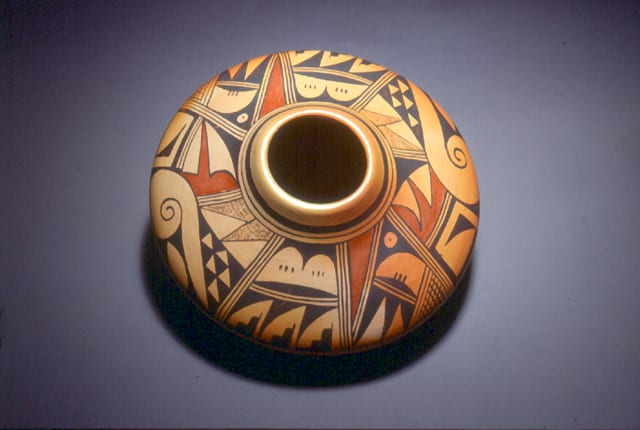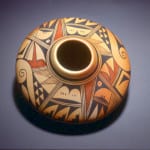Hopi low-shoulder jar, Verna Nahee (Daughter of Ethel Youvella). Verna was born in 1940 and is a teacher at the Polacca Day School. Verna Nahee is not an exceptionally famous potter and this pot is not perfect in the care of painting or design, but it is (perhaps) the most representative and is one of the most powerful pots in my collection. It has the classic Sikyatki revival shape, clear and attractive blushed firing, and a design in the classic revival style. Moreover, the design is well proportioned to the pot, symmetrical & carefully drawn: note its intricate, swirling construction. Note the simple image of the pot when viewed from below. The immense power of this pot, however, is not in its perfection (an Anglo value), but in the beauty of its imperfection. These imperfections, like the classic break line, which it lacks, reflect the imperfect beauty of human life and creation. Perfection is reserved for the Creator.
Also, notice, as is typical of much Sikyatki Revival design, that the design elements are balanced. Thus, for me, this pot reflects human life, complex, busy, swirling and yet balanced and centered, especially when you look at the whole and not just a single imperfect element. The very imperfections of its color, shape, and design give this pot its power to evoke (in me) the spirit of life. A great pot. “Ours is kind of ‘broader’ in design, others do finer designs,” Verna explains in Fourteen Families, “You have to have a clear mind. You have to be in the mood or they won’t turn out. I just like to make to satisfy me (Dillingham, 1994:13).”
Verna Nahee and her mother Ethel Youvella are part of the Chapella family of potters. (See Dillingham, 1994.) For background information about Verna Nahee and a photograph, see J. E. Collins (1977:16). On May 22, 1994, I visited with Verna outside her home, as she was preparing to fire two piki bowls made as “giveback” presents for a wedding.



